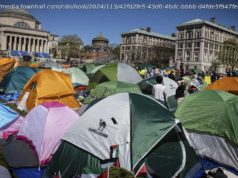Americans could use a commission that studies our founding—as long as it’s thorough, historian-led and nonpartisan.
Before even taking office, Joe Biden pledged to disband Donald Trump’s 1776 Commission—designed to promote “patriotic education” and counter the New York Times’ controversial “1619 Project,” which put slavery at the center of the American historical narrative. And by 12:01 p.m. on Inauguration Day, the commission’s extravagantly mocked “1776 Report,” a 45-page, unsourced so-called “definitive chronicle of the American Founding” (released only 48 hours earlier on Martin Luther King Jr. Day), vanished from the White House website. The disappearance was cheered by professional historians and large swaths of the population. The Trump administration’s commission was “a hack job” reflecting a “clumsy partisan intent,” argued two leading historians. It was a history written by nonhistorians that was responsible for “obscuring facts and ignoring historical context.” The American Historical Association called the report “a simplistic interpretation that relies on falsehoods, inaccuracies, omissions and misleading statements.” But a thorough, historian-led, nonpartisan commission on the founding isn’t such a bad idea. These kinds of history-driven government initiatives, when done right, have in the past been useful tools for fostering unity and promoting civic responsibility—two things America is badly in need of today. If Biden wants to promote his call for “unity” and respond “to the call of history,” as he said in his inaugural address, he can offer no stronger foundation than a new, improved government-led project to provide a factual foundation of America’s origins and a nonpartisan discussion of our founding ideals. The 1776 Commission clearly faltered in conception and execution, but the basic premise of a government commission on our founding history has a long precedent. Since the 19th century, the federal government has created many such commissions, particularly regarding the American Revolution and founding era. They’ve expanded the focus of American history, boosted national unity and even promoted concepts of liberty internationally. In 1924, for example, President Calvin Coolidge signed the George Washington Bicentennial Celebration Commission into existence six years before the event and sought to “ensure intellectual rigor” by incorporating historians and the American Historical Association. It led to public commemorations around the world, historians’ presentations in the capital and the publication of an edited collection of Washington’s letters. Taking place during the Great Depression, it roused the “whole land” “in spite of economic distress,” said Commission Director Sol Bloom, and it did “more to aid in maintaining national sanity during these distressful times than anything else could possibly have done,” reported the Muncie Post-Democrat. In 1973, Congress created the American Revolution Bicentennial Administration, which offered a chance to reengage with America’s history. As President Gerald Ford said in 1976, “We Americans should pause and consider what our country means to us—and what it means to the world.” In the wake of Watergate and Richard Nixon’s resignation (some previously accused Nixon of politicizing the commemoration), the Bicentennial, which included public events and academic components, spurred unity and inclusivity with nearly all of the population participating in some fashion combined with a major expansion in diverse public historical sites.






